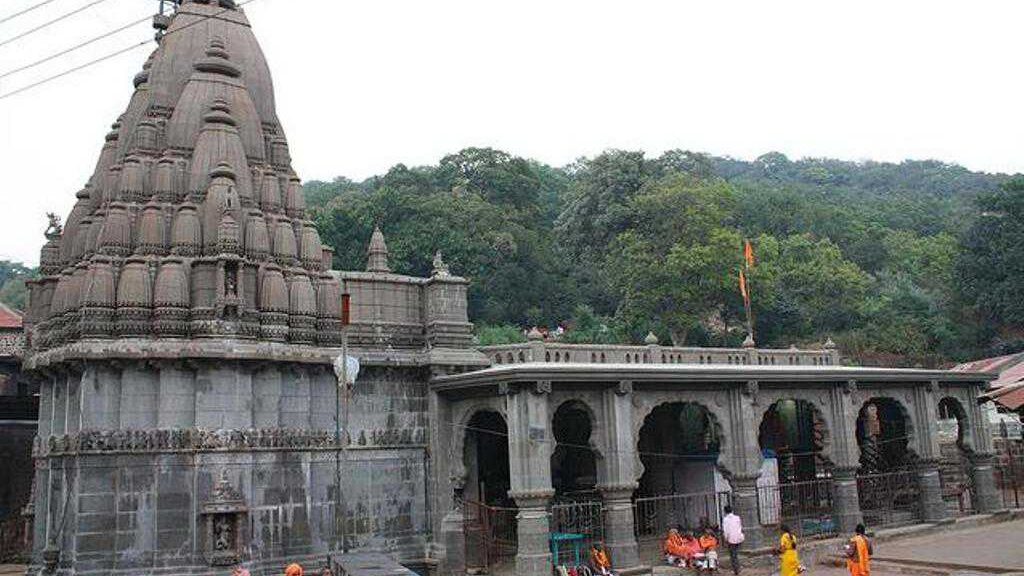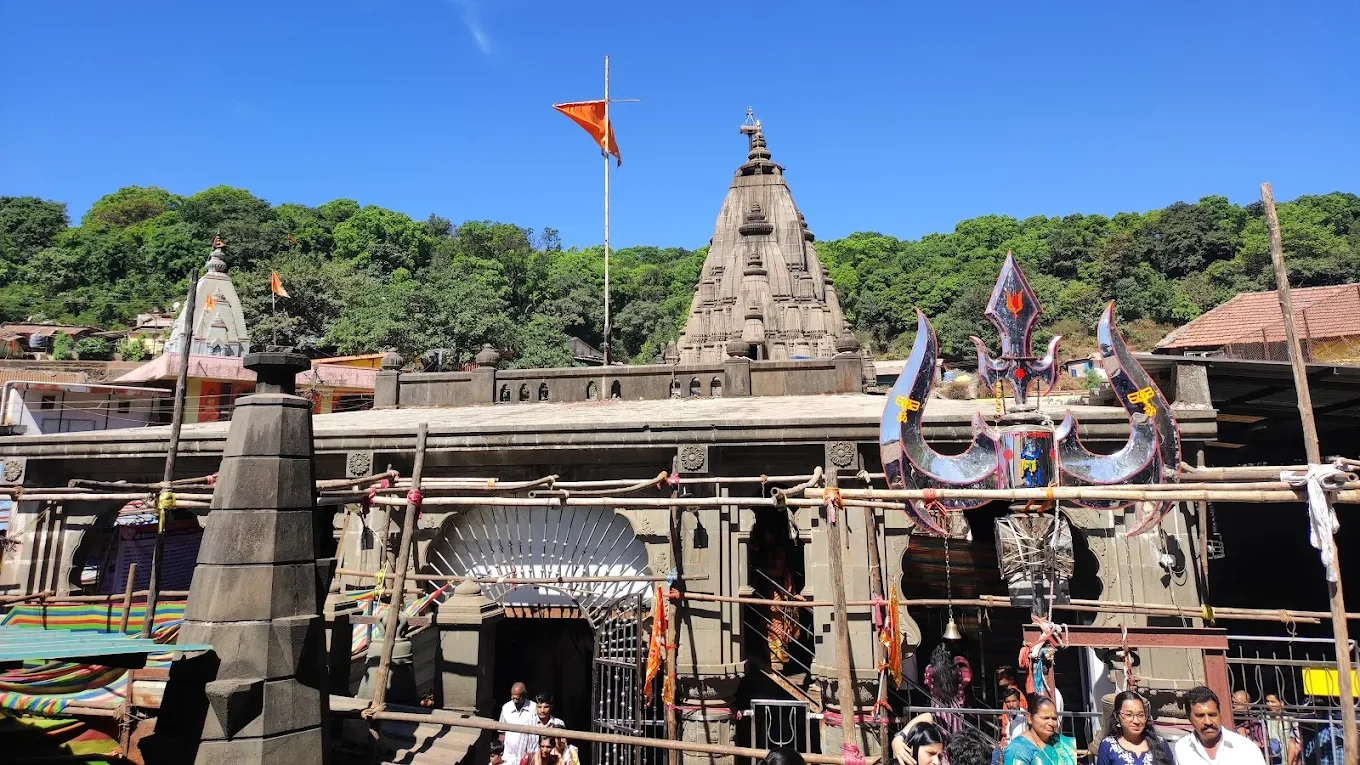In Maharashtra’s Sahyadri hills is the famed Jyotirlinga temple known as Bhimashankar Temple, which is devoted to Lord Shiva. The Bhimashankar temple, which is well-known for its mythological significance, tranquil environs, and customary rites, draws thousands of devotees and spiritual seekers each year. Of the twelve Jyotirlingas in India, it is among the most potent.
Mythological Story of Bhimashankar Temple
Ancient texts link the Bhimashankar temple to the story of Tripurasura, a strong demon who vanquished the gods and wreaked havoc on the cosmos. He was killed by Lord Shiva in his Rudra form, who thereafter made his home in the Bhimashankar jungle. His tremendous power created the river Bhimarathi, and the Bhimashankar jyotirlinga was built to honor the glorious occasion.
During Shravan Maas and Maha Shivratri, when people assemble to worship Shiva at the Bhimashankar temple, this story is frequently told on the temple grounds.
Temple Architecture
Ancient stone carvings, elaborate pillars, and shikharas that evoke 13th-century temple designs are all features of the Bhimashankar temple that exhibit Nagara-style architecture. The Maratha king Nana Phadnavis later restored the temple and added to its spiritual heritage by renovating it.
During daily pujas, the Bhimashankar temple‘s black stone Shiva linga, which is housed in a tiny shrine, is frequently decorated with flowers, milk, and bilva leaves. The shrines of Lord Vishnu, Ganesh, Kartikeya, and Nandi are all part of the temple complex.
Location & Accessibility
Location: Maharashtra’s Bhorgiri village, close to Pune
About 3,250 feet above sea level is the elevation.
Mumbai (220 miles) and Pune (110 km) are the closest cities.
The Bhimashankar Wildlife Sanctuary, which includes the endangered Giant Indian Squirrel (Shekru) and a variety of other plants and animals, encircles the Bhimashankar temple.
Puja Timings and Daily Schedule
The Bhimashankar temple opens early in the morning and performs a number of ceremonies all day long.
- Opening Time: 4:30 AM
- Kakad Aarti: 5:00 AM
- Abhishekam: 6:00 AM–11:00 AM
- Maha Aarti: 12:00 PM
- Evening Aarti: 7:30 PM
- Closing Time: 9:30 PM
Special Pujas:
- Rudrabhishek Puja
- Laghu Rudra Path
- Shravan Somvar Puja
- Pradosh Vrat Puja
- Maha Shivratri Night Jagran and Mahapuja
Platforms such as YatraDham.org, which provides recognized services and comprehensive package options, allow online booking of pujas for the Bhimashankar jyotirlinga

Trek to Bhimashankar Temple
In and of itself, the trek to the Bhimashankar temple is a wonderful experience. Trekkers and nature lovers frequently choose the Khandas–Ganesh Ghat or Sidhi Ghat paths because they go through deep forests, hills, and waterfalls. During the monsoon season, when the landscape is verdant and hazy, this trek is particularly well-liked.
- Trek Duration: 4–6 hours (one way)
- Difficulty Level: Moderate
- Best Season: July to February
Bhimashankar Wildlife Sanctuary
The Bhimashankar temple lies inside a reserved forest area and sanctuary known for its biodiversity. The sanctuary is home to
- Shekru (Giant Indian Squirrel)
- Leopards, Barking Deer, Wild Boars
- Over 200 bird species and medicinal plants
This makes the visit not just religious but also educational and eco-spiritual.
Travel Tips for Visiting Bhimashankar Temple
- It is not permitted to wear shoes within the temple grounds.
- Because of the hilltop setting, bring light clothing if you are going in the winter.
- The sanctuary is a plastic-free area, so stay away from it.
- Make reservations for pujas in advance, particularly during holidays.
- Bring water, dry snacks, a walking stick, and appropriate footwear if you’re trekking.
Festivals Celebrated at Bhimashankar Temple
During Hindu holidays, the Bhimashankar temple is a main center of activity. Maha Shivratri is a grand celebration with jagran, pujas, and bhajans that last all night.
Every Monday during Shravan Month, there are special pujas attended by sizable audiences.
Additionally important are Nag Panchami, Pradosh Vrat, and Kartika Purnima.
During these days, devotees frequently engage in group Rudra chanting and Annadanam, or food donation.
Online Puja Booking: A Modern Solution
If you’re planning to visit or perform pujas from afar, online puja booking at Bhimashankar Temple ensures you don’t miss out on rituals. These services include:
- Verified Pandit services
- Live video darshan
- Prasad delivery to home
- Customized puja options
YatraDham.org is one such trusted portal offering these services.

Why Visit Bhimashankar Temple?
- Spiritual Power: One of the 12 Jyotirlingas of Lord Shiva
- Mythological Significance: Connected to ancient Vedic stories
- Architectural Grandeur: Ancient temple design and carvings
- Eco-Spiritual Experience: Located in a wildlife sanctuary
- Peaceful Getaway: Ideal for meditation, photography, trekking, and inner reflection
Conclusion
The Bhimashankar temple is a spiritual experience more than merely a place to visit. The Bhimashankar Jyotirlinga is the ideal location for spiritual enlightenment and tranquility, regardless of your preference for seeking Lord Shiva’s blessings, exploring old Indian architecture, or connecting with nature.
FAQs
Q1. What is the location of the temple of Bhimashankar?
The Bhimashankar temple is located in the Sahyadri Hills in the Maharashtra region of Pune.
Q2. What function does the Bhimashankar temple’s shrine serve?
It is believed that Lord Shiva defeated the demon Tripurasura at this location, one of the twelve Jyotirlingas.
Q3. Can I make an online reservation for a puja at the Bhimashankar Jyotirlinga?
Yes, people can make online reservations for pujas at the Bhimashankar temple through a variety of websites.
Q4. When is the ideal time to go to the shrine of the Bhimashankar temple?
The monsoon season, Maha Shivratri, and Shravan month are regarded as the ideal periods.
